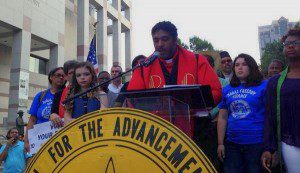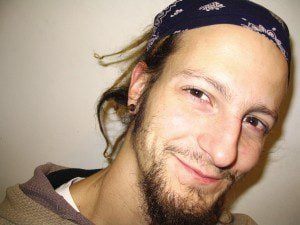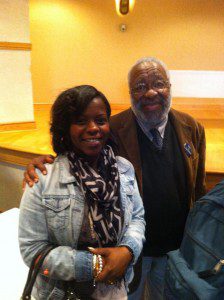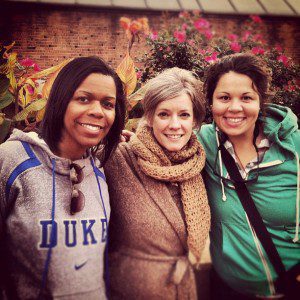Rev. William Barber is one of our most hope-filled prophets for justice in America today. Since I was a sixteen year-old trying to recover from Religious Right political aspirations, he has been a patient yet persistent guide in my life. For the past six years, Rev. Barber has been organizing the largest coalition for peace and justice in North Carolina–HKonJ. Rutba House has been a proud partner of the coalition from its very beginning. In this election year when so many special interest groups are buying airtime, I’m glad to share this reflection from Rev. Barber.
By Rev. William Barber
Last night I was in Wilmington, North Carolina, listening to practitioners who work among the poor, the hungry, the homeless, the jobless. I heard about certified nursing assistants living in homeless shelters. I heard about a homeless shelter that was kept from opening its doors because of public political pressure. I heard of gross actions of environmental racism in a town that poisoned 600 acres of land.
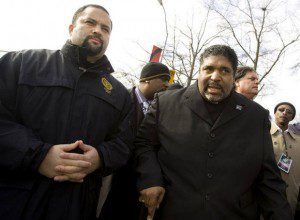
I heard about families who still use outdoor toilets because they can’t afford to hook into water and sewer systems. I heard about restricted covenants signed in 1938 by the McCall family that still impact economic development today. The only way these race and class based acts toward the poor ever get public exposure is to shine the light of truth on them.
The Judeo-Christian faiths are built on a strong foundation. Beware of policies that hurt the poor. The Old Testament calls out:
Woe to those who make unjust laws, to those who issue oppressive decrees, to deprive the poor of their rights and withhold justice from the oppressed of my people, making widows their prey and robbing the fatherless.
And the New Testament responds clearly:
The Spirit of the Lord is upon me, because he has anointed me to proclaim good news to the poor.
The Good News is the news of systemic transformation for those who have been made poor by the breaches and brokenness of our society’s structure. The Good News is these ancient Judeo-Christian values are enshrined in our State Constitution: You must govern for the good of the whole. These values represent the first principles of our state. They provide the over-arching vision of the work of our Government. We must, therefore, always ask: Are decisions made by those who would govern us made for the good of the whole? Or are they being made for the good of a small set of special interests? The NAACP has had a special interest for 102 years. We are interested in the poor.
Individual charity alone will not address this problem. The moral requirement of our Constitution and the moral underpinnings of the Biblical truths require more than a call to private charity. They require a call to structural change and systemic reorientation.
This problem of poverty did not just begin in 2008, when the Republicans were in the White House. Nor did it just begin when the Democrats were in the White House in 2009. No. Over 44 year ago, Dr. King begged us to look at it honestly. He said America needed a Stimulus Plan 44 years ago. Dr. King’s stimulus plan called for a “bottom-up” approach, not a “banker-down” approach. Wall Street cannot drive a society based on Justice. Capitalism cannot be driven crazy by greed. If we ignore the poor, if we ignore those on the bottom, there will eventually be an implosion.
There were 40 million poor people without health care before the crisis got public attention. There were 50-100 million people under-insured. There were millions and millions of people out of work. Almost 20% of African-Americans were jobless BEFORE the crisis was public. Millions of poor children! More than 52% of African-Americans who qualified for stable, low-rate loans, were illegally steered to predatory sub-prime loans before CNN discovered the crisis. More families across the state are falling into poverty and facing hardship. Last year, North Carolina’s poverty rate-17.5 percent-was the highest it has been since 1981. Poverty in North Carolina grew by 22 percent over the course of the Great Recession. The median household income in North Carolina dropped 12.3% since 2007. During the Great Recession, approximately 300,000 jobs were lost in North Carolina while the state’s workforce continued to grow. As of November 2011, the jobs deficit in North Carolina stood at more than half of a million.
In the southern half of the North Carolina Black Belt, my ancestors helped liberate themselves from slavery, fighting with Abraham Galloway’s Colored Brigades. And then, instead of getting 40 acres and a mule, they got tricked into signing sharecropping contracts that immediately re-enslaved them. But tens of thousands of free men and free women joined Mr. Lincoln’s Republican Party, moved to larger cities and built grassroots fusion movements with white farmers and small land-owners and businessmen in Wilmington, and Fayetteville and Goldsboro, and other growing urban areas. For a brief period in the 1890’s, they won both houses of the General Assembly, the Governorship, both US Senate seats and many county court houses.
The former slave owners and their corporate allies, frightened by this initial effort to heal the breach, implemented a plan of homegrown terrorism in Wilmington, and other parts of southeastern NC. Murdering scores of Black men on the streets of Wilmington, the largest city in the State, in November 1898, they engineered the only coup d’état in the United States. Thousands of African Americans and their white allies were traumatized by this divide and conquer tactics of the extremist and racist right-wing. People were rousted from their beds, and were helped to get out of town and try to re-establish their lives in the poorest counties in the Southeast.
So we need to get behind the data. The data needs to be disaggregated with historical analysis, with rural-urban analysis, with Black, Native American, Latin American and European American analysis. How were the poor people of the area divided? How were they conquered? Especially since the present Speaker in the People’s House called on his constituents to develop a divide and conquer politics in North Carolina.
We will not put up with being divided. We are a special interest group. We have a special interest in God’s Human Race. We have seen it divided. We are Repairers of the Breach. All God’s Children are Precious. They are all Special. And we have a special interest in them.


